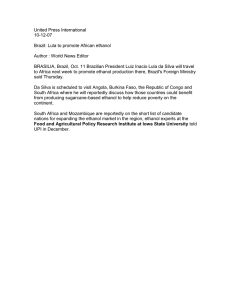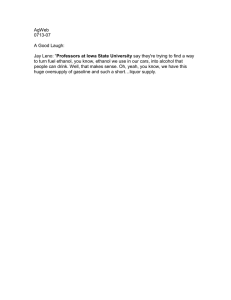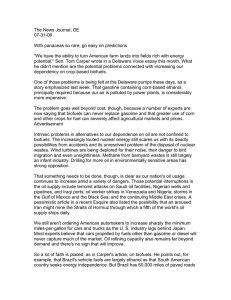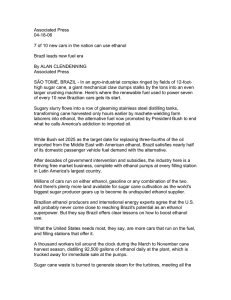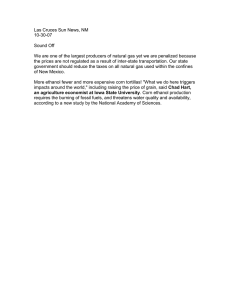United Press International 04-12-06 Brazil Bustling to Meet Ethanol Demand
advertisement
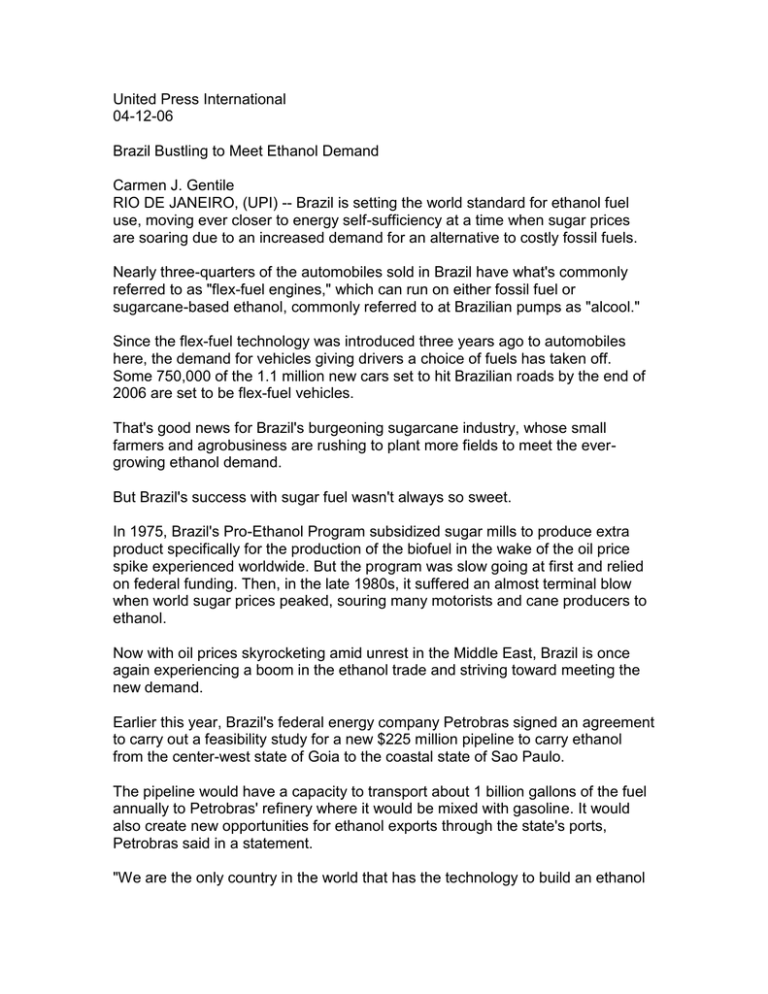
United Press International 04-12-06 Brazil Bustling to Meet Ethanol Demand Carmen J. Gentile RIO DE JANEIRO, (UPI) -- Brazil is setting the world standard for ethanol fuel use, moving ever closer to energy self-sufficiency at a time when sugar prices are soaring due to an increased demand for an alternative to costly fossil fuels. Nearly three-quarters of the automobiles sold in Brazil have what's commonly referred to as "flex-fuel engines," which can run on either fossil fuel or sugarcane-based ethanol, commonly referred to at Brazilian pumps as "alcool." Since the flex-fuel technology was introduced three years ago to automobiles here, the demand for vehicles giving drivers a choice of fuels has taken off. Some 750,000 of the 1.1 million new cars set to hit Brazilian roads by the end of 2006 are set to be flex-fuel vehicles. That's good news for Brazil's burgeoning sugarcane industry, whose small farmers and agrobusiness are rushing to plant more fields to meet the evergrowing ethanol demand. But Brazil's success with sugar fuel wasn't always so sweet. In 1975, Brazil's Pro-Ethanol Program subsidized sugar mills to produce extra product specifically for the production of the biofuel in the wake of the oil price spike experienced worldwide. But the program was slow going at first and relied on federal funding. Then, in the late 1980s, it suffered an almost terminal blow when world sugar prices peaked, souring many motorists and cane producers to ethanol. Now with oil prices skyrocketing amid unrest in the Middle East, Brazil is once again experiencing a boom in the ethanol trade and striving toward meeting the new demand. Earlier this year, Brazil's federal energy company Petrobras signed an agreement to carry out a feasibility study for a new $225 million pipeline to carry ethanol from the center-west state of Goia to the coastal state of Sao Paulo. The pipeline would have a capacity to transport about 1 billion gallons of the fuel annually to Petrobras' refinery where it would be mixed with gasoline. It would also create new opportunities for ethanol exports through the state's ports, Petrobras said in a statement. "We are the only country in the world that has the technology to build an ethanol pipeline," Petrobras Chief Executive Sergio Gabrielli said in February. "To make the ethanol market grow is strategic for the world, not just for Brazil." Officials in Brasilia also appear on board. Agricultural Minister Roberto Rodrigues has called for a $10 billion investment in the sugarcane industry, which is already the largest in the world. If Brazilian projections for ethanol demands come true, then the pipeline and the minister's request for additional sugar investment would fuel the growing global demand for alternatives to oil. However recent spikes in global sugar prices have once again threatened the ethanol trade. Demand has outweighed supply of late in Brazil and led some drivers to cry foul and accuse ethanol producers of price-gouging. Producers here insist that the recent price spike at the pump is a mere blip and that within a month's time, prices will drop when the next cane harvest is reaped and processed. A reduction in ethanol prices would also bode well for Brazilian aspirations to be energy self-sufficient, a dream of administrations past when the federal ethanol program was first implemented. "If Brazil increases its petroleum and ethanol production, it may very well be able to become energy efficient," Amani Elobeid, an international sugar analyst at Iowa State University, told United Press International. "With the dramatic increase in flex-fuel cars, Brazil will also rely more on domestically produced fuel," she added. So great is Brazil's demand for ethanol that the government has decided to reduce the mandatory ratio of ethanol to gasoline in every liter of fuel pumped. Prior to the decision, 25 percent of every liter of gasoline contained ethanol. That ratio has been reduced to 20 percent in hopes that Brazil can meet pure ethanol users' demands and perhaps even increase ethanol exports to countries like the United States, where President George W. Bush has made public a desire to see the country rely less on Middle Eastern nations to fuel American cars. In that sense, Brazil is decades ahead of the United States as leaders contend the country could be become fuel autonomous in the near future. "Now whether this [Brazil's fuel independence] will happen within the next year or so remains to be seen," Elobeid said. © Copyright 2006 United Press International, Inc. All Rights Reserved
